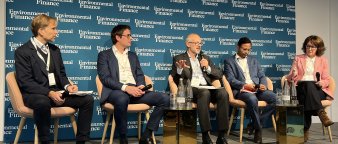Storebrand re-introduces its corporate management trainee program. In this interview, Tara Kawkabishad, one of the first participants, shares her insights into life at Storebrand, the challenges of solutions investment, and her quest to find opportunities to drive meaningful change though working in finance.
Welcome Tara. You joined Storebrand after finishing a degree at NHH Norwegian School of Economics, where you had a very prestigious scholarship – can you please tell us a bit more about that?
During my master’s degree studies at NHH, I explored the maritime sector through both my thesis and a course called “Commodity Trading and Transport”, which gave me a deeper understanding of the shipping industry's role in global value chains. My thesis (i) focused on seafarer attrition and marine insurance, which helped me see how operational risks and workforce dynamics can influence financial outcomes in complex industries. Based on this. I was also honoured to receive a scholarship from the Norwegian Shipowners’ Association in recognition of this work.
This was a deep dive in a particular area, but it’s of very practical relevance in investment: when researching a company, it’s important to look at the full picture—not just what the company produces, but how it brings its products to market. If a company is globally exposed, the way it transports its goods can have a significant impact, both financially and environmentally. Understanding this part of the value chain helps give a more complete view of the business model and whether the company can truly be considered a scalable and sustainable solution provider.
It’s a little while now into your time at Storebrand - what led you to make the choice to come onboard?
I've always had a deep passion for finance and sustainability. I find it fascinating how financial tools and strategies can be used to create value and drive innovation. At the same time, I care deeply about sustainability and finding solutions that contribute to a better society. For me, it's not just about returns, but about the direction in which capital is moving the world.
When I learned more about Storebrand, it became clear that this is a company that truly excels at combining financial expertise with a strong commitment to responsible investment. They’re not just participating in the market; they’re shaping it in a way that aligns with long-term societal and environmental goals. That made the decision to join Storebrand an easy one.
So where has your journey in the Storebrand group’s corporate management trainee program taken you so far, in terms of getting experience across different areas of the company?
My first rotation was in our Investment Control and Analytics team, where I gained a solid foundation in the operational side of asset management.
In my current rotation with the Solutions Team, I’ve had the opportunity to dive much deeper into the core of investment management. I’ve learned how investment decisions are made, not just from a financial perspective, but also through a thematic lens. One of the most valuable lessons has been understanding how to identify companies that qualify as 'solution companies', those that actively contribute to solving global challenges, and how to assess their scalability and financial strength within a portfolio.
This experience has also sharpened my ability to think critically about how sustainability themes are integrated into investment strategies. Being part of a portfolio management team has given me a front-row seat to how ideas are developed, challenged, and refined, both through data and dialogue. It’s been a steep learning curve, but incredibly rewarding to see how strategic thinking, financial analysis, and impact considerations come together in real investment decisions.
Could you tell us more about your current role in the Solutions team?
I feel incredibly grateful to be working alongside such skilled and experienced colleagues in the Solutions Team.
My role involves a range of responsibilities, all of which are grounded in company research and thematic investment work. I contribute to identifying companies that align with specific sustainability themes, and this research supports several key tasks. For instance, I’ve been developing thematic one-pagers on selected portfolio companies — materials that are used in client communication to explain how each company contributes to a broader theme, while also highlighting their financial fundamentals.
I’m also currently writing a whitepaper on the circular economy, where I explore how this theme is evolving and how it translates into investable opportunities. In addition, I support the team by applying my coding skills, particularly in Python, to assist with internal models and data analysis.
What ties all of this together is the focus on understanding what makes a company a true solution provider. That means evaluating not only its thematic relevance, but also its scalability, financial strength, and long-term potential. Much of this work happens in close dialogue with the portfolio managers, which has given me valuable insight into how thematic ideas are shaped into real investment strategies.
At first glance, what stands out to you as the biggest challenges and opportunities in this area of investment?
One of the biggest challenges is that there’s rarely a perfect company that solves a global problem in a clean, straightforward way. Real-world solutions are often complex, and investing in them requires navigating trade-offs, between impact and scalability, between innovation and financial stability, and sometimes even between short-term performance and long-term potential.
That said, this complexity is also what makes the work so meaningful. The opportunity lies in identifying companies that are genuinely contributing to positive change, even if they’re not perfect. It’s about understanding the nuances, how a company’s core business aligns with a sustainability theme, how scalable its solution is, and whether it can deliver both impact and financial value over time.
You recently published some insights on the EU Clean Industrial Deal - have you been analysing other aspects of EU regulation?
Yes, alongside my work on the EU Clean Industrial Deal, I’ve also explored broader EU policy developments such as the REPowerEU Plan and Germany’s infrastructure package. These frameworks have provided useful insight into how regulation is evolving to support energy security, industrial competitiveness, and the green transition.
In particular, energy security has been a recurring theme. According to the International Energy Agency (IEA), energy security refers to the uninterrupted availability of energy sources at an affordable price, both in the short term, responding to sudden changes in supply and demand, and in the long term, ensuring timely investments to meet future energy needs (ii). Through this work, I’ve gained a broader understanding of how policy can influence investment flows, shape value chains, and create new opportunities for companies operating in Europe.
In what ways do you think this particular rotation in the corporate management trainee program will prepare you for addressing the evolving needs of clients and the company?
This rotation has given me a deeper understanding of how thematic investment strategies are developed and communicated, both internally and to clients. Working closely with highly skilled portfolio managers has helped me see how client needs, sustainability themes, and financial performance are integrated into real investment decisions.
I’ve also had the opportunity to contribute to research, regulatory analysis, and client-facing materials, which has strengthened my ability to translate complex topics into clear insights. I believe this will be important as clients look for more tailored, transparent, and impact-driven investment solutions.
Overall, I’m very grateful for this rotation, as it‘s helped me build a broader perspective on how to align client needs with the company’s strategic goals, in a rapidly changing market landscape.
Endnotes
(i) Seafarer Attrition and Marine Insurance Claims; Kawkabishad, Tara; Kuchroo, Prav Kowshik; https://openaccess.nhh.no/nhh-xmlui/handle/11250/3158944
(ii) Energy Security – Topics - IEA
Related content







